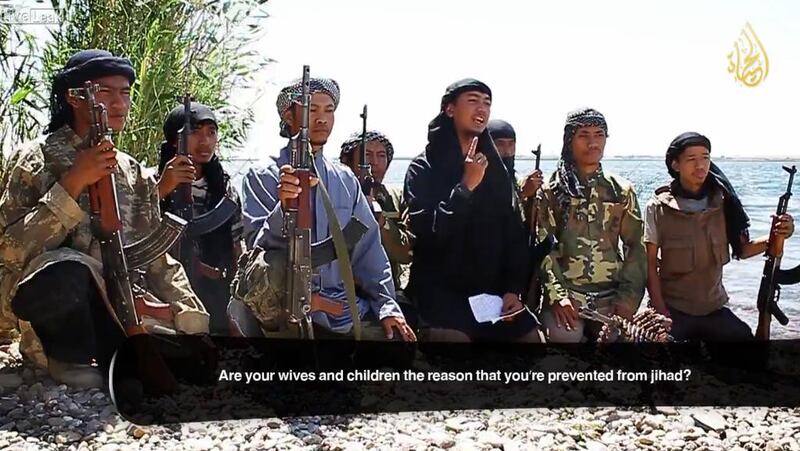Brandishing AK-47s, the group of men march along the shoreline with religious music playing and a voice-over calling on followers to join their cause.
"We are your brothers from Indonesia who have come to the Islamic State," declares Abu Mohammed Al Indonesi in his native tongue Bahasa Indonesia, when the camera cuts to the next scene. Al Indonesi goes on to make an impassioned plea to his countrymen to follow in his footsteps.
The slick, eight-minute video produced by ISIL, entitled "Join the ranks", is just one of many tools used by the extremist group as it revs up its propaganda machine to radicalise potential followers from South-East Asia.
With hundreds of recruits having travelled to Iraq and Syria to join the extremists, analysts warn that ISIL's growing influence in the Malay Archipelago cannot be ignored by the region's leaders.
ISIL has set up a combat unit in Syria dedicated to training and recruiting fighters from South-East Asia.
Established in August 2014, the Katibah Nusantara - or the Malay Archipelago Combat Unit - is headquartered in Al Shadadi, in the north-eastern province of Hassakeh.
The battalion is made up of about 100 fighters from Indonesia and Malaysia, and reaches out to their supporters and sympathisers in their respective languages - Bahasa Indonesia and Malay.
"The growing reach of Katibah Nusantara could lead to its expanding influence in ISIL's decision-making process, in turn leading ISIL [to give] greater priority to South-East Asia as its war zone," warned Jasminder Singh, a terrorism analyst at Rajaratnam School of International Studies in Singapore.
In April, the unit captured five Kurdish-held territories in Syria, wracking up military gains for the first time since its launch.
"This battlefield success was highlighted in the jihadi and ISIL's social media, especially in the Indonesian and Malay languages, partly to entice new recruits to join the cause," said Mr Singh in a May report.
Singapore's prime minister Lee Hsien Loong warned in May that South-East Asia has become a key recruitment centre for ISIL.
Speaking at the Shangri-La Dialogue, an annual Asia Pacific security summit, he said more than 500 Indonesians and dozens of Malaysians are believed to have joined the terrorist group in Iraq and Syria.
"Even in Singapore, where we have a peaceful, well-integrated Muslim population, some individuals have been led astray. A few have gone to join ISIL and others have been intercepted and detained before they could leave," said Mr Lee.
ISIL supporters have been churning out blogs, forums and websites in Malay, and publishing magazines such as Al Mustaqbal, run by a pro-ISIL network in Indonesia, that has also been widely circulated in Malaysia.
The publications tout the victories of the militant group in Iraq and Syria, and seek to glorify martyrs, especially those from Malaysia and Indonesia.
"They feed their sympathisers with fairy tales," said Ayob Khan Mydin Pitchay, principal assistant director of Indonesia's Bukit Aman counter terrorism division.
ISIL magazine Dabiq has also been translated into the Indonesian and Malaysian languages.
Causing much alarm to authorities, ISIL posted a video in March showing Malay-speaking children in ISIL-held territory wielding weapons in one scene, and reciting the Quran and praying in another. It was the first video showing children from South-East Asia training for combat.
"ISIL is highly adept in the use of social media - it is Hollywood-style messaging and this has proved to be highly effective, compared to Al Qaeda where you had old men rambling on which did not win traction with extremists and the youth," said Mr Singh.
Already, at least 30 militant groups in South-East Asia, including terror network Jemaah Islamiyah, have pledged their allegiance to ISIL leader Abu Bakr Al Baghdadi since June last year.
A key concern for South-East Asian governments is the threat posed by battle-hardened militants returning to their home countries, said Dr Julie Chernov Hwang, chairperson of the department of political science and international relations at Goucher College in the US.
"Do they attempt to bring what they've learned back to their respective home countries? Will they inspire others to follow in their footsteps and join ISIL? Will returnees mount terror attacks? How do the relationships they built when abroad enable them to secure funds to mount terror attacks at home?"
The goal of Katibah Nusantara is to "eventually establish an archipelagic Islamic state in South-East Asia", according to the Institute for Policy Analysis of Conflict, a Jakarta think tank.
ISIL has made no secret of its desire to establish a wilayah - or province under its "caliphate" - in South-East Asia.
Singapore's prime minister has dismissed those aspirations as "a grandiose, pie-in-the-sky dream".
However, Mr Lee admitted "it is not so far-fetched that ISIL could establish a base somewhere in the region, in a geographical area under its physical control like in Syria and Iraq, to have territory in South-East Asia".
If that happens, he said, "it would pose quite a serious threat to the whole of South-East Asia.".
jtan@thenational.ae
From Indonesia to Singapore to Malaysia, ISIL spreads its web of evil
Calls for Malay and Indonesian recruits through a slick campaign are having an effect, while making what could also be a regional foothold for the 'caliphate'.

Editor's picks
More from the national




